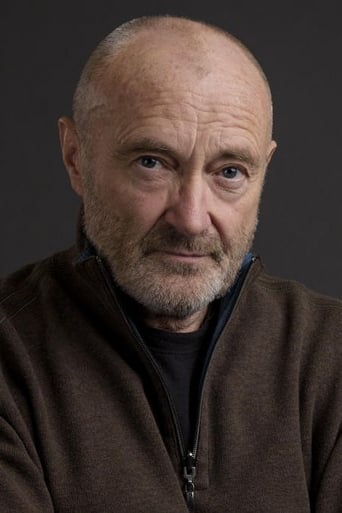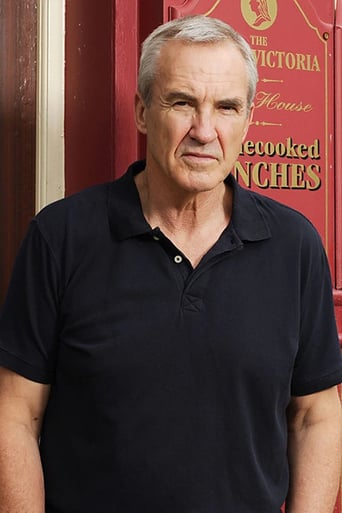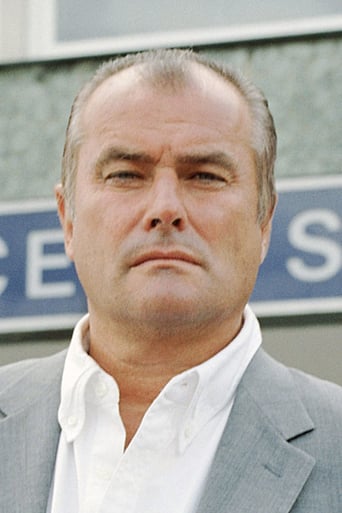Steineded
How sad is this?
Spoonatects
Am i the only one who thinks........Average?
CrawlerChunky
In truth, there is barely enough story here to make a film.
Dana
An old-fashioned movie made with new-fashioned finesse.
screenman
The idea of chart-topping 'Genesis' front-man Phil Collins playing the role of notorious east-end Great Train Robber 'Buster' Edwards was enough to put me off this movie for life. I didn't see it until many years after its release, and only then by accident on television.I have to say that I owe Mr Collins an apology. If he'd not had so much previous form in the pop-charts I'd have hardly recognised him.The so-called Great Train Robbery was the most audacious and successful crime-caper carried out by the biggest team of amateurs in British Criminal history. It naturally suited the authorities of the day to hype them up as a cunning, ruthless brigade of experts, because it helped draw a veil over their own lax security, and profound political embarrassment that the heist engendered. Compared to the vicious, homicidal scumbags of today, these guys were little more than a bunch of chancers. Notorious Big-Man Ronnie Biggs was only involved by invitation as an afterthought. He was a tradesman, but this job offered more.It's a low-key representation of the crime which, I suspect, more aptly represents the bumbling, uneducated behaviour of those involved, who simply got very lucky, and then became extremely notorious. Collins excels as the working-class wideboy, getting in far too deep and never stopping to consider the broader implications of stopping one of Her Majesty's Mail trains, and stealing millions of pounds.His confusion and inability to contend with the juggernaut that follows is entirely believable. Likewise Julie Walters as his long-suffering but doting moll of a wife, torn between what the proceeds could offer and her hankering for an ordinary, stable family life.The culture clash in Mexico is perfectly realised. Untravelled and untutored English homebodies who have never done anything more exotic than pick winkles on Southend Pier, suddenly find themselves in a hot, tropical paradise that actually proves to be anything but. They can't have the food and drink they grew up with. Everything is 'foreign'. They don't\understand the language, the currency; they're confused by everything and everyone. Like true Brits abroad; they don't adapt well. His wife is first to crack, transported away from all of her family and friends, the familiar if drab neighbourhoods that now seem like heaven. The culture-clash is finally shattered open when one of their children sickens and they have no idea what to do or say. They can make no sense of the hospital. Their anxiety and confusion is an object-lesson. For 'er-indoors'; it's the last straw.Eventually, stricken with home-sickness and with finances depleted; Edwards goes back to face the music. The establishment will show no mercy. It's a blatant miscarriage of justice. But it was not the first, nor would it be the last.We finally see him at his flower stall, much older and little wiser. Edwards was a hapless nobody, a small-time criminal prospector who hit paydirt. The Robbery was the second biggest thing he experienced because it changed his life. His wretched suicide much later was the biggest, because that ended it.It's a movie that I found thoroughly entertaining against all expectations, and won over a deeply-held prejudice about popstars taking to an acting career, and using their singing status to leapfrog undiscovered strugglers.
gary-444
I "boycotted" this film for a long time for two main reasons. Firstly i hate Phil Collins brand of smarmy music, and secondly ,glamourising a nasty crime by paying to see it was morally not something i was prepared to do.Although i stand by my original two points i have to confess that i got it wrong about the film.It is an affectionate retrospective view of Sixties England and has a touch of the "Ealing Studios" about it. The "mechanics" of the robbery are glossed over, and Phil Collins does a pretty competent job " carrying" the film, ably supported by the versatile Julie Walters as his long suffering wife.Crime doesn't pay, the main players get picked up pretty quickly, and those that don't are either getting ripped off themselves or are looking over their shoulder all the time, or both. The period touches are largely sharply observed, the contemporary soundtrack faithful and enjoyable, Collins "Two hearts" and the Four Tops "Acupolco" totally dis-resonant from proceedings.Viewed as a piece of period fiction it is entertaining, pacey, light and humorous.As an insight into the Robbery, Edwards or the gang it is laughable.
James Hitchcock
Possible SpoilersIn August 1963 a gang of London criminals robbed the Glasgow to London mail train and stole about £2,500,000 in used banknotes, in what became known as 'The Great Train Robbery'. This film tells the story of Ronald 'Buster' Edwards, one of the gang- not just his part in the robbery, but also his life on the run afterwards. Although most of his accomplices were quickly arrested, Edwards initially escaped to Mexico, but later returned to Britain where he was imprisoned for fifteen years. The film was advertised under the slogan 'He'll steal your heart', and the character portrayed by Phil Collins is, if not exactly a lovable character, certainly a likable one. Whatever his other faults may be, Edwards is shown as a devoted family man, and the most important relationship in the film is that between him and his wife June. When he goes to Acapulco to live a life of comparative luxury on the proceeds of his crime, June and their young daughter Nicky accompany him. June, however, loathes life in Mexico, where she cannot speak the language and hates the food, and returns to England, taking Nicky with her. Buster is forced to choose between his family and his freedom, as he knows that if he goes back to join them he is likely to be betrayed and arrested. Both the main roles are well played. Phil Collins amply refutes the prejudice that singers cannot act and should not be allowed to try, and he receives excellent support from Julie Walters as the narrow, insular June, quite unable to adapt herself to the culture and lifestyle of any part of the world located more than about two miles from the Elephant and Castle. (For non-British readers, this is a working-class district of South London). There is also a good deal of nostalgic sixties detail- the fashions, the flickering black-and-white televisions, the garish geometrically patterned wallpaper, and the music. (Several pop songs of the era feature on the soundtrack). The Great Train Robbers all received heavy sentences (some of thirty years in jail), and the film suggests that this was as a result of political interference in the judicial process. This may be true- the robbery certainly came as a great embarrassment to Britain's Conservative government. The government prided itself on a strict stance on morality and on law and order, but two months previously it had been involved in a major scandal when one of its senior members, John Profumo, had been forced to resign as a result of sexual impropriety. The punishments doled out to the robbers may have been a way of demonstrating to the nation that the government was winning the fight against crime. Insofar as the film shows that all the robbers were punished for their offence, some possibly more severely than they deserved, it cannot be said to glamorise crime, unlike some fictitious 'heist' movies which show the criminals getting away with it or which, like 'The Italian Job', add an artificially moralistic ending to an otherwise amoral film to keep the censor happy. Nevertheless, I was still unhappy with the way in which some of the aspects of the robbery were treated in 'Buster'. In the actual robbery the train driver, Jack Mills, was beaten over the head and seriously injured when he tried to resist the robbers. This incident is omitted from the film. Buster complains that he and his accomplices have been treated more harshly than Profumo was 'for sleeping with a tart who gave all our secrets to the Russians', implying that the authorities are more lenient towards upper-class wrongdoers than towards working-class ones. (In fact, Profumo was not charged with any criminal offence, and neither he nor his mistress Christine Keeler was ever involved in espionage). The Great Train Robbers may not have been engaged in an 'act of organised banditry' or 'warfare against the community' (as a judge said about them in a fine example of judicial hyperbole), but neither were they working-class heroes putting one over on the establishment, as the film likes to imply. They were simply petty criminals who got lucky and pulled off a big one.The fictitious Buster Edwards as portrayed by Phil Collins might have been capable of stealing hearts, but I doubt if his real-life counterpart was quite so engaging. 'Buster' may not glamorise the life of the criminal but it does, I feel, gloss over the more sordid aspects of a real-life crime story by turning it into a romantic comedy. As I watched it I felt that if June had really loved Buster she would have tried harder to overcome her aversion to eating chilli con carne rather than fish and chips. And if he had really loved her he would have found a more honest way of earning his living. 7/10
lespike
Just tracked Buster on DVD (for £4 - bargain, or so I thought, more of that later) and gave it a watch today, to be delighted all over again from the last time I saw it, which must have been a few years ago!The film manages to capture the essence of the 60s, and delivers it over to the audience, in a style which I thought was very convincing. Don't listen to your friends when they kick up a fuss about seeing this film because it's got Phil Collins in, ignore it, he can act and does very well in the movie. A mention should also be given to the ever dependable Julie Walters, who yet again gives a solid performance.While on the subject of Julie Walters, I really like the opening scenes in Acapulco (with nice music from Four Tops behind the flying shots over Mexico) as it shows you in an instant that the character of Julie Walters is never going to fit into her environment, as she can be seen wearing dreary colours, a head scalf, thick coat etc and has nothing to match the elegance of the country and it's people. Although Julie Walters can be seen to fit into her forced situation as the scenes in Mexico progress (shown nicely in her choice of clothing I think) you can see she is never really comfortable with it, and her departure back to England was always going to happen.The film also seems to be accurate to the story of the 63 Great Train Robbery, except for two point, the driver of the train (Jack Mills?) wasn't shown to be as serious hurt as he was by the gang, and Buster also slaps his wife in the Mexico market scene, something the real life Buster has been quoted as saying he would never do, or never did such a thing.Still don't let this (or the funny (not haha) ending) overshadow your opinion on the movie, truly is a goodun.Oh and there is a DVD release doing the rounds at the moment, that really is not worth it, as it presents the film in a badly transferred 14:9 image within a 4:3 frame which just looks dull and awful. Go for the proper DVD release in it's glorious 1.85:1 aspect ratio.






